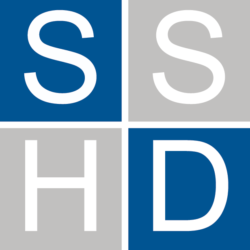Taking closer look at research and experiences of SSHD members
~Researchers’ Windows~
This month we are getting better acquainted with the research of Michael Cunningham, a professor in the department of Psychology and the undergraduate program in Africana Studies at Tulane University.
What drew you to do work in human development?
I was drawn to the field as a college student by changing my major from Computer Science to Child Development. While I enjoyed the classes and planned to focus on a career in Computer Science and Math, I did not have passion for the field. So, I took a class that required me to do a practicum in an elementary school. My life changed after working in a 4th grade classroom. I thought I was going to change the world, one classroom at a time. So, I changed my major to Child Development with a focus on Elementary Education. After college I went to grad school and began having more intense research experiences. I realized that I could continue doing research that impacts policies and future research directions as well as train individuals who would work with young people. I was particularly interested in research with African American males. The extant literature was full of examples of psychopathology, antisocial behaviors, delinquency, and school underachievement. Missing from the research was research on the developmental processes that are associated with why some males have challenges and why some males in the same environment do not, and in fact, are very successful. This latter point is especially salient for research examples associated with typical human development for underrepresented populations generally, and African American males specifically.
Did you have any mentor or a researcher who had substantial influence on your path or work? Is there a significant moment or story that capsulizes the nature of that influence on your scholarship or professional journey?
My mentor is Margaret Beale Spencer. I met her when she gave a guest lecture in one of my undergraduate classes. Her lecture was perfectly timed for me as I just finished reading her chapter on Black children and cognitive/affective linkages, which is in an edited volume that she co-edited with Geraldine Kearse Brookins and Walter Allen (Spencer, Brookins, & Allen, 1985, Beginnings: The social and affective development of Black children). After hearing her lecture, I inquired about volunteering for her research project. I starting working with her my last semester in college and subsequently applied to work with her in graduate school. My admiration grew even more in graduate school when I was able to learn from Dr. Spencer in formal and informal contexts. Her research and theorizing is the foundation of how I approach my work. I also got to know her family too. She exemplifies the balance between work and family. Dr. Spencer is great academic, researcher, professional, and mentor. She is equally as good as a spouse, mother, and grandmother. I try to live my life by emulating her. She instilled in me to do research that is scientifically strong, meaningful, and has the potential to impact change in the lives in which the research is based.
You have a range of important work, select 1-2 findings that you feel are key contributions to human development.
- Your current project and/or key projects
My current project examines potential buffers to students exposed to challenges. Using mixed methodologies, my research team is exploring how moderators (e.g., prosocial behaviors, racial identity, domain specific social support, etc.) are associated with short- and long term outcomes (academic, psychosocial, and mental health). To date we have collected two waves of data and the team is embarking on including focus group and interview data before a 3rd wave of data collection begins. The participants are high school students who attend an open enrollment charter school in the south central part of the United States. Over 90% of the participants are African American and approximately 50% reside in single mother headed households. Preliminary findings indicate that there are gender differences in prosocial behaviors, with boys benefiting more from prosocial behaviors than girls. This finding is distinct from the extant literature that does not report gender differences in prosocial behaviors. Our findings highlight that while there are no gender differences in students’ reports of prosocial behaviors, outcomes such as antisocial behaviors are thwarted more for boys who report high prosocial behaviors than girls who report equivalent levels of these behaviors.
- Contributions of your projects/research to the study of human development.
My current and past contributions to the field are mainly associated with understanding gender-specific trajectories in African American adolescents who reside in urban environments. For example, my research on hypermasculine attitudes in adolescent African American males has indicated that negative community experiences has a long term impact on hypermasculine attitudes. This impact is above and beyond the experiences that males have in their home and school environments. By using a human development perspective, the findings suggest that researchers and applied personnel have to simultaneously examine the communities in which males are raised as well as other direct associations. We cannot just focus one context alone. Thus, collaborative relationships between multiple areas (e.g., home and community, school and home, and community and school) are needed to successfully understand human developmental undergirding issues as well as adolescent outcomes.
Your one wish for the study of human development. If you had just one wish for the study of human development, what would it be?
My wish is for a continued focus on typical developmental processes as a core component of our research and translational work. This means including social address variables in which children and adolescents have no control as normative experiences that human have. I wish that normative development as described in the field include issues associated with racial/ethnic diversity and at the intersections of all aspects of human development (cognitive, psychosocial, and biological). In doing so, we as developmental scientist must emphasize that no one aspect of human development is more or less important than another, but that developmental processes interact with where we live as well as developmental stages throughout the lifespan.
A mentoring statement or quote you find most meaningful or life-changing.
Racial and ethnic minority populations deserve good science that is representative of their human developmental experiences.
About a researcher
 Dr. Cunningham is a professor in the department of Psychology and the undergraduate program in Africana Studies at Tulane University. He completed an undergraduate degree at Morehouse College, his doctoral studies at Emory University, and a post-doctoral fellowship at the University of Pennsylvania. As a developmental psychologist, he has a program of research that focuses on racial, ethnic, psychosocial, and socioeconomic processes that affect psychological well-being, adjustment to chronic stressful events, and academic achievement among African American adolescents and their families. He uses mixed methods in his current research project that includes the study of gender-specific patterns of resilience and vulnerability in urban African American participants. He is currently Associate Provost for Graduate Study and Research and has been bestowed the Weiss Presidential Teaching Award.
Dr. Cunningham is a professor in the department of Psychology and the undergraduate program in Africana Studies at Tulane University. He completed an undergraduate degree at Morehouse College, his doctoral studies at Emory University, and a post-doctoral fellowship at the University of Pennsylvania. As a developmental psychologist, he has a program of research that focuses on racial, ethnic, psychosocial, and socioeconomic processes that affect psychological well-being, adjustment to chronic stressful events, and academic achievement among African American adolescents and their families. He uses mixed methods in his current research project that includes the study of gender-specific patterns of resilience and vulnerability in urban African American participants. He is currently Associate Provost for Graduate Study and Research and has been bestowed the Weiss Presidential Teaching Award.
Edited and launched by Yoko Yamamoto & Deborah J. Johnson
SSHD Publicity Committee








